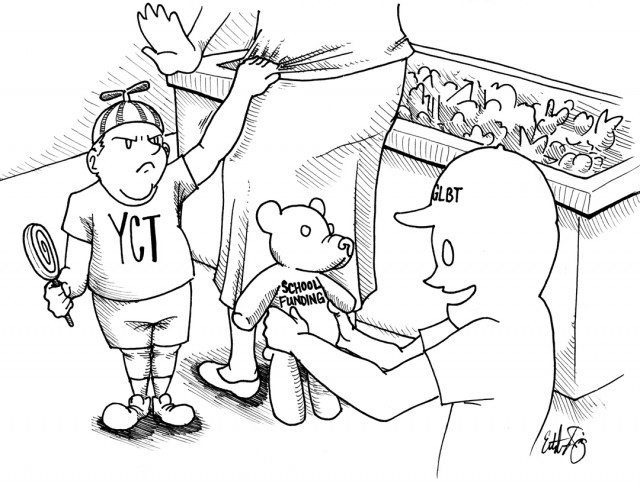State Rep. Wayne Christian is afraid to say that he thinks universities should not fund programs for gay and transsexual promotion.
In fact, he is so afraid of proclaiming this belief that he has tried to finagle a new amendment through the Legislature that would require all publicly funded schools to “use an amount of appropriated funds to support a family and traditional values center for students of the institution that is not less than any amount of appropriated funds used by the institution to support a gender and sexuality center or other center for students focused on gay, lesbian, homosexual, bisexual, pansexual, transsexual, transgender, gender questioning or other gender identity issues.”
On its face, the amendment looks to seek a balance in the university sphere. The amendment, however, is Christian’s backdoor way to defund GLBT programs at public universities. “These gender centers are not about providing health services or counseling services, they are about promoting a certain life style and culture,” a statement from Christian read.
“Universities would continue to provide health and counseling services to homosexual students the same as they do now – through their general health and counseling services that are provided for all students.”
The Young Conservatives of Texas chapter at the University of Texas at Austin approached Christian before the House began its budget talks to promote its idea for traditional values centers. Tony McDonald, a UT law student and the vice chairman of the university’s YCT chapter, told Inside Higher Education that the group was trying to get the GLBT centers defunded and the avenue that was most likely to pass was to just require traditional values centers.
Inside Higher Education said McDonald doesn’t think public universities should be giving money to the promotion of any sexuality of set of values and that those beliefs should be personally promoted rather than university-funded.
These centers — like the LGBT Resource Center at Texas A&M and the Gender and Sexuality Center at UT — have sponsored such events as “Celebrating Bisexuality Day” and “Coming Out Week” on each campus. Christian said those events are “promoting a certain life style and culture.”
The propriety of GLBT centers’ events is not what we have chosen to discuss. There are indeed strong points on either side of that debate — both that the promotion of homosexuality is not the duty of taxpayers’ funds and that at some point universities can and should help its students find common ground.
The problem here is that the YCT and Christian are acting childishly and what is at stake is more of taxpayers’ money than the state currently spends. That is, requiring state schools to promote both sets of beliefs in hopes that states will defund all programs is hypocritical.
Since Christian and the YCT are opposed to these programs, the proposal of an amendment either restricting their activity or calling for the removal of such programs would be legitimate.
Thanks to this amendment, public universities would have to spend exactly twice as much as is currently spent. Christian said his intent is to rid schools of programs he feels are antithetical to a university’s purpose. His amendment, however, looks to promote not one, but two such programs — a move that is both fiscally irresponsible and shady. The budget bill that includes Christian’s amendment was passed in the House with a 110-24 vote. The Senate is set to decide on the budget bill and in doing so should either alter or remove the amendment. State leaders are charged with the protecting their constituents and taxpayers’ money. Christian, by ramming an esoteric and unethical amendment through the House, has failed his job.
This type of legislating should not be accepted because if we begin to make rules that have intentions ulterior to their wording the already complicated process will be more convoluted and unethical.
